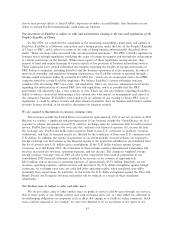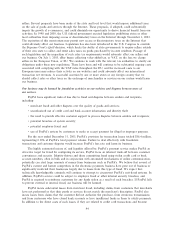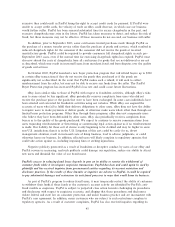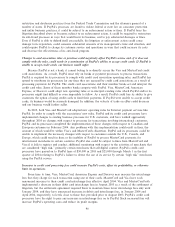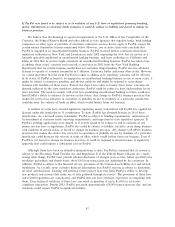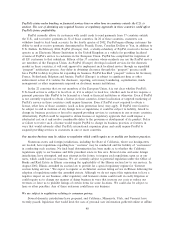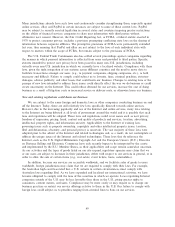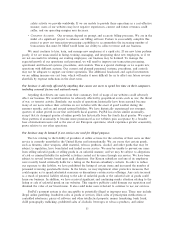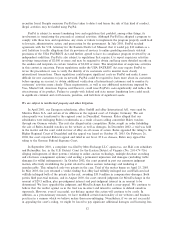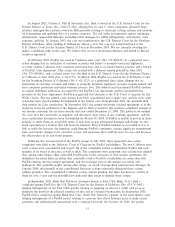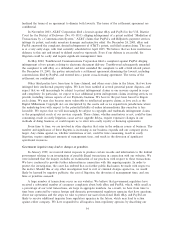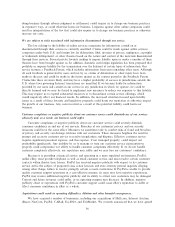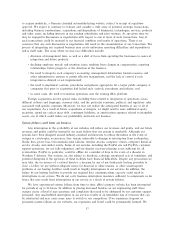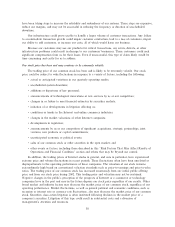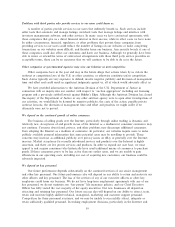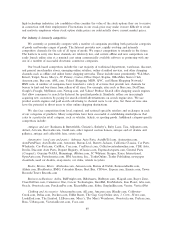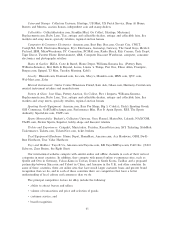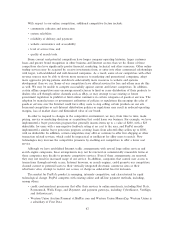eBay 2003 Annual Report Download - page 55
Download and view the complete annual report
Please find page 55 of the 2003 eBay annual report below. You can navigate through the pages in the report by either clicking on the pages listed below, or by using the keyword search tool below to find specific information within the annual report.In August 2002, Charles E. Hill & Associates, Inc. Ñled a lawsuit in the U.S. District Court for the
Eastern District of Texas (No. 2:02-CV-186) alleging that we and 17 other companies, primarily large
retailers, infringed three patents owned by Hill generally relating to electronic catalog systems and methods
for transmitting and updating data at a remote computer. The suit seeks an injunction against continuing
infringement, unspeciÑed damages, including treble damages for willful infringement, and interest, costs,
expenses, and fees. In January 2003, the case was transferred to the U.S. District Court for the Southern
District of Indiana. After pending in Indiana for almost a year, the case was transferred back to the
U.S. District Court for the Eastern District of Texas in December 2003. We are currently awaiting the
judge's scheduling order in the case. We believe that we have meritorious defenses and intend to defend
ourselves vigorously.
In February 2002, PayPal was sued in California state court (No. CV-805433) in a purported class
action alleging that its restriction of customer accounts and failure to promptly unrestrict legitimate
accounts violates California state consumer protection laws and is an unfair business practice and a breach
of PayPal's User Agreement. This action was re-Ñled with a diÅerent named plaintiÅ in June 2002
(No. CV-808441), and a related action was also Ñled in the U.S. District Court for the Northern District
of California in June 2002 (No. C-02-2777). In March 2002, PayPal was sued in the U.S. District Court
for the Northern District of California (No. C-02-1227) in a purported class action alleging that its
restrictions of customer accounts and failure to promptly unrestrict legitimate accounts violates federal and
state consumer protection and unfair business practice laws. The federal court has denied PayPal's motion
to compel individual arbitration as required by the PayPal User Agreement and has invalidated that
provision of the User Agreement. PayPal has appealed that decision to the U.S. Court of Appeals for the
Ninth Circuit. The two federal court actions have been consolidated into a single case, and the state court
action has been stayed pending developments in the federal case. In September 2003, the plaintiÅs Ñled
their motion for class certiÑcation. In November 2003, the parties tentatively reached agreement as to the
monetary terms for settlement of the disputes and we fully accrued for this tentative settlement amount in
our income statement for the three months and year ended December 31, 2003. The parties have notiÑed
the court that they need time to negotiate and document other terms of any resulting agreement, and the
class certiÑcation hearing has been rescheduled for March 29, 2004. If PayPal is unable to prevail in these
lawsuits or settle them on acceptable terms, it may have to pay substantial damages and change its anti-
fraud operations in a manner that will harm its business. Even if PayPal's defense is successful or if it is
able to settle the lawsuits, the litigation could damage PayPal's reputation, require signiÑcant management
time, and require changes to its customer service and operations that could increase its costs and decrease
the eÅectiveness of its anti-fraud program.
Following the announcement of the PayPal merger in July 2002, three purported class action
complaints were Ñled in the Delaware Court of Chancery by PayPal stockholders. The two California state
court actions were consolidated and stayed. All of the complaints named as defendants PayPal and each
member of its board of directors as well as eBay. The complaints were purported class actions that alleged
that, among other things, eBay controlled PayPal prior to the execution of their merger agreement, the
defendants breached Ñduciary duties they assertedly owed to PayPal's stockholders in connection with
PayPal entering into the merger agreement, and the exchange ratio in the merger was unfair and
inadequate. The plaintiÅs sought, among other things, an award of unspeciÑed compensatory damages. In
January 2004, the plaintiÅs in the consolidated Delaware actions voluntarily dismissed these actions
without prejudice. The consolidated California actions remain pending, but there has been no activity in
them for over a year and the plaintiÅs have indicated their intent to dismiss these actions.
In September 2002, Bank One Delaware (formerly known as First USA Bank, N.A.) Ñled a
complaint against PayPal in the U.S. District Court for the District of Delaware (No. 02-CV-1462)
alleging infringement of two First USA patents relating to assigning an alias to a credit card so as to
eliminate the need for the physical presence of the card in a Ñnancial transaction. In September 2003,
PayPal Ñled a complaint against Bank One Corp., Bank One Delaware's parent, in the same district court
alleging infringement of a PayPal patent relating to a process that allows Internet users to make secure
payments and authenticated transactions over a computer network. On October 20, 2003, the parties
53


